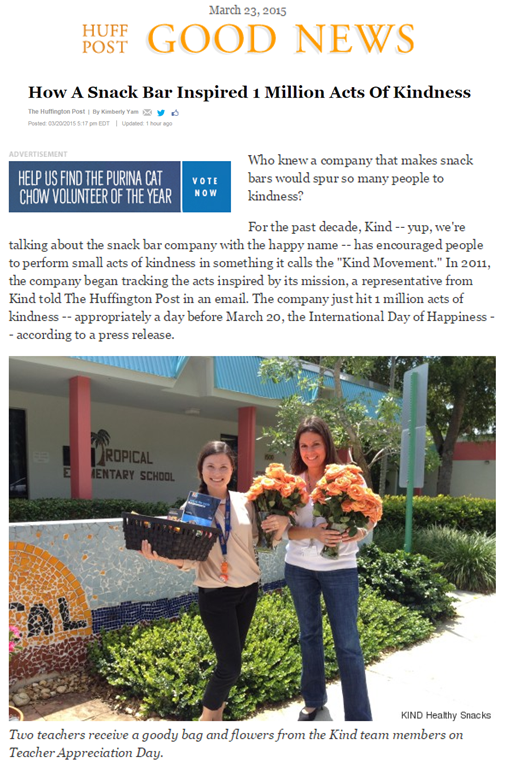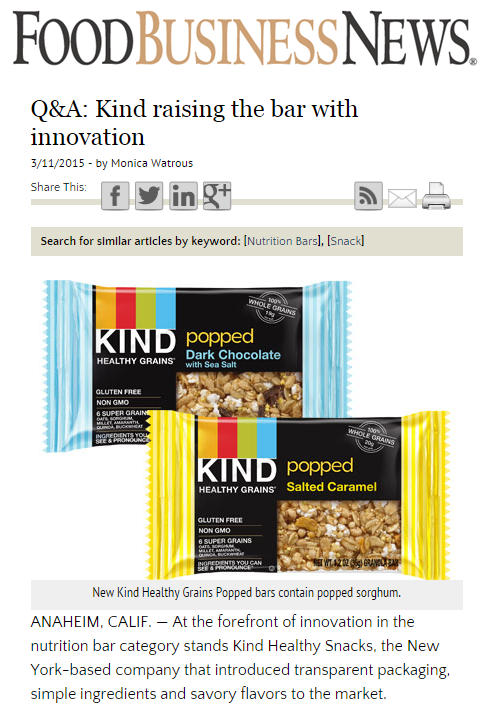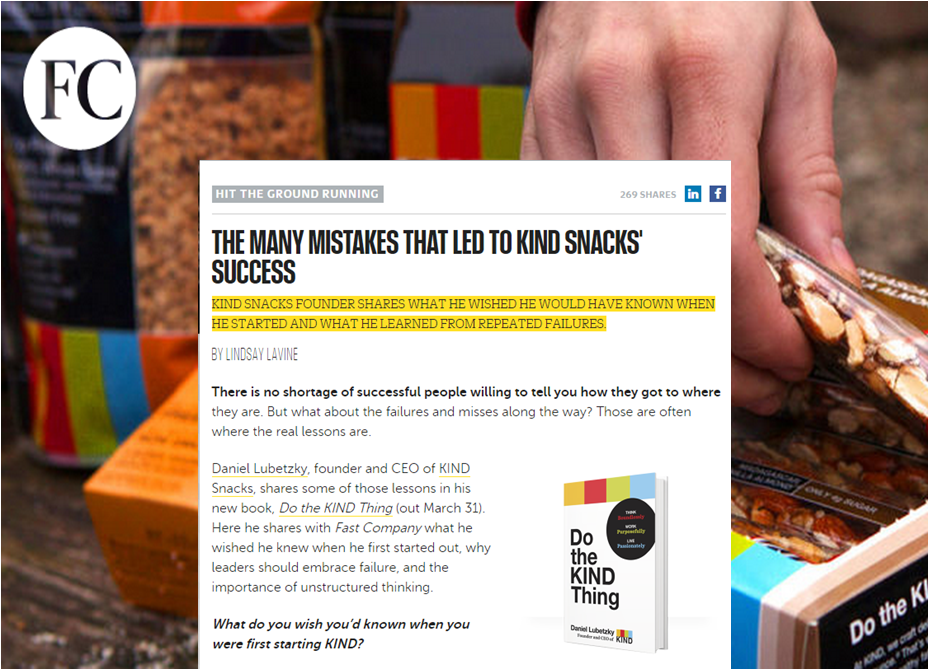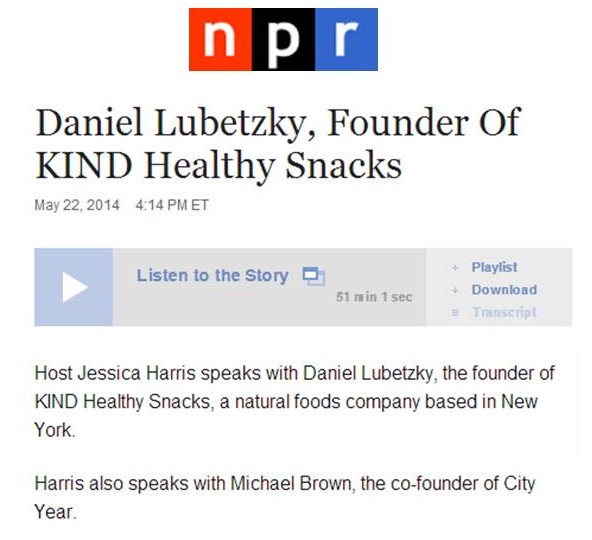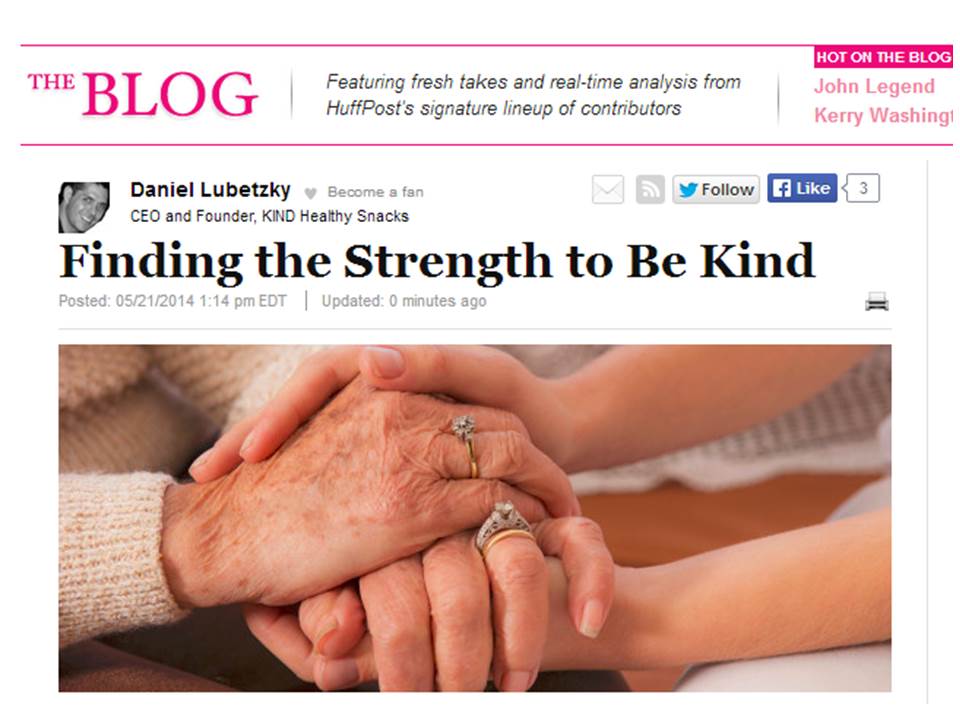Archive for the ‘KIND Snacks’ Category
The company’s team members have been taking note of kind acts performed, facilitated or celebrated as part of the movement.
They also track the people involved in their “Kind Causes” program. As part of the program, every month, people submit causes they’re passionate about to the company’s website, while others vote for the cause that resonates with them. The cause with the most votes then gets a $10,000 grant from Kind.
The acts tracked by Kind have included things like delivering coats to homeless people, shoveling strangers’ driveways during snowstorms and creating care packages for soldiers overseas.
Hitting the 1 million mark is a milestone for the company, but Kind Founder Daniel Lubetzky wrote in his book, “Do The Kind Thing,” that the idea started small.
“In the beginning, we would do unexpected kind acts for people, like carrying their groceries or holding umbrellas over them as they walked in the rain,” Lubetzky wrote. “But the light bulb came on when we realized that our community could be challenged to join us in our journey … Soon after, we made them the protagonists and started seeking more creative ways to energize people to do good.”
Meet our New and Exciting KIND Healthy Grain Bar flavors!
Published under Food Industry, KIND Snacks Mar 13, 2015On the many mistakes that led to KIND Snacks’ success
Published under Entrepreneurship and Management, Introspection, KIND Snacks, Leadership Feb 17, 2015Reflecting on the mistakes I’ve made along the way and the lessons I’ve learned from them.
So many people shared their enthusiasm at seeing a KIND cameo in the Amazon press conference that I also wanted to share. Congratulations to Amazon on the exciting launch of the Fire Phone! We are honored to be a part of the demonstration of this innovative new technology! Jeff and Amazon are such great partners, and we are proud to work with them.
(see starting at minute 26)
Here’s Why I Refuse to Use the E-Word
Published under Entrepreneurship and Management, KIND Snacks Jun 20, 20142 Reasons KIND’s CEO Won’t Use The ‘E-Word’
JACQUELYN SMITH
JUN. 19, 2014, 12:19 PM
There are a few words Daniel Lubetzky absolutely refuses to use. “Boss” is one of them; “employee” is another.
“I don’t use the word ‘employee’ because it can imply someone is working ‘for’ you rather than ‘with’ you,” the founder and CEO of KIND Healthy Snacks tells Business Insider.
Instead, he calls his staff “team members.”
Lubetzky says he can’t recall having ever used the “e-word.” “I just don’t like it,” he says. “Not using it reinforces the level of accountability we each have to one another.”
In other corporate cultures, he explains, you might be accountable only to your manager or someone else recognized as a leader within the organization. “Here, you are equally accountable to the person sitting on your left, the person sitting on your right, and the person you run into in the hallway. We are all part of the same family and on the same journey. Our actions impact all of our fellow co-owners.” (Every KIND employee is a shareholder.)
And this is so important, he says, because a culture of accountability motivates people, inspires them to be resourceful, and pushes creativity to new limits.
Choosing “team member” over “employee” is also “one small way that we manifest our commitment to one another,” says Lubetzky. “The word ‘employee’ can feel impersonal and, as such, doesn’t fit our notion of the KIND team as a family. Consciously choosing ‘team member’ over ‘employee’ also helps promote a culture of support,” he concludes.
Here’s Why I refuse to use the B-Word
Published under Entrepreneurship and Management, KIND Snacks Jun 05, 2014
Daniel Lubetzky, founder and CEO of KIND Healthy Snacks, refuses to use the B-word.
JACQUELYN SMITH
JUN. 4, 2014, 3:00 PM
Boss, that is.
“I’ve never liked what that word connotes,” he tells Business Insider. “A ‘boss’ has all the answers, whereas a team leader has the final word, but his or her decisions emanate from the wisdom of the team and from earnest discussion.”
A “boss” might also feel as if they’re above the rest, Lubetzky, a Mexico City native, explains. While a team leader treats everyone equally.
Another reason he doesn’t use the B-word: It detracts from the “sense of communal ownership that we promote at KIND by making every team member a shareholder and owner of the company.” And, finally, he says, words like “boss” can devalue the role of team members, when everyone has an equally important role to play.
So, when did Lubetzky decide to eliminate “boss” from KIND’s vocabulary?
Before the company even started.
“When the brand was conceived in 2003 with just a handful of team members, there was a shared sense of ownership and accountability — just as there is today,” he explains. Lubetzky and his team were committed to building something special together — and as the company continued to grow (its products are now sold in over 80,000 stores), they all worked hard to remain true to KIND’s core values, and to maintain the culture they set out with. So, there was never a moment in time where they paused and decided to stop using the word “boss,” he says. “We just never used it in the first place.”
Since its inception, Lubetzky has found that not using this word ensures open dialogue and maximum communication, which is important in any relationship. “It empowers team members at all levels of the organization to speak up, share their opinions, and respectfully disagree with those around them.”
But some team members — especially those who haven’t been part of the company since the beginning — find it difficult to refrain from using the B-word.
“I do have some people on the team, particularly those with 20 or 30 years’ experience, who are used to introducing me to others as their ‘boss’ or as ‘the owner,’ or they instinctively give me advice using, ‘your company’ or ’for you,’” Lubetzky says. “It takes a few reminders that it’s not ‘me’ but rather ‘us,’ and it’s not ‘my company’ — it’s ‘our company.’ And ‘we’ are all the owners.”
Interestingly, he says it ends up being these team members who most appreciate the attitude. “And because they are co-owners — financially, emotionally, culturally, and in terms of how decisions are reached — they don’t take it for granted.”
So, how do people refer to Lubetzky, the company’s chief executive?
“It’s most commonly just as ‘Daniel,’ or maybe, ‘the dude with the confused accent,’” he says.













